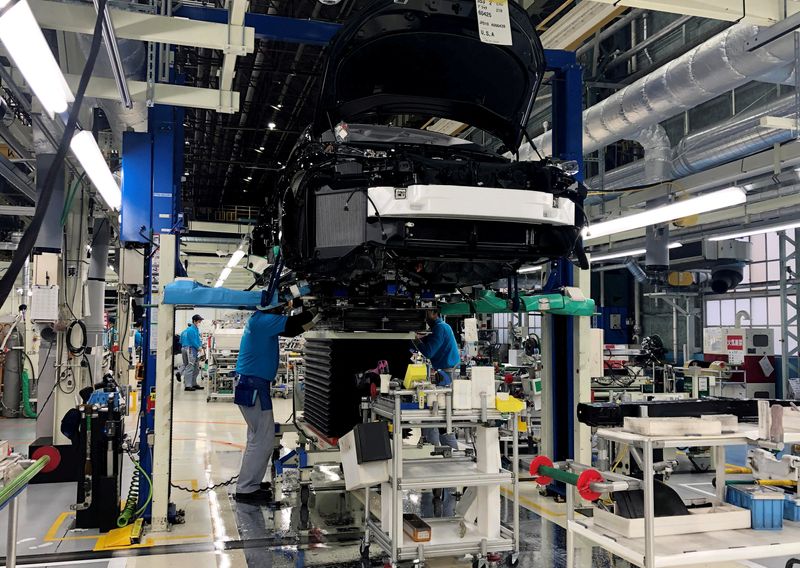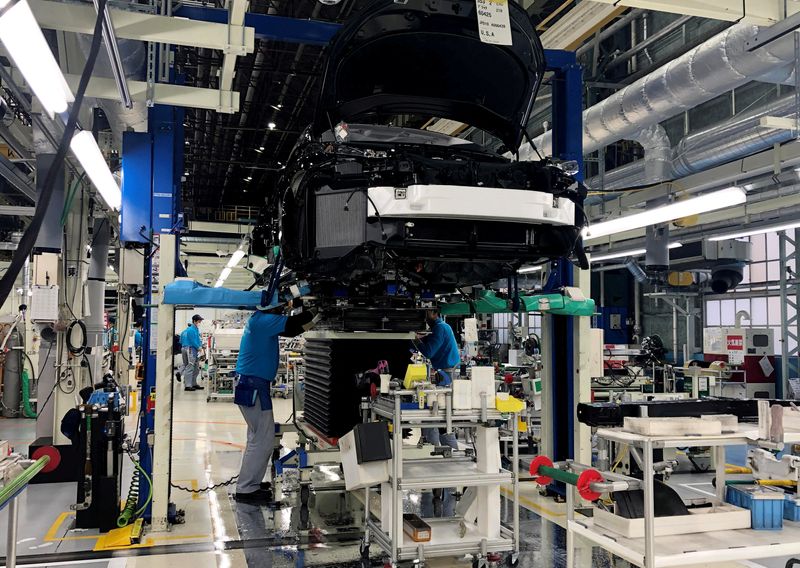Stock Markets
Toyota agrees to biggest wage hike in 25 years, paves way for BOJ shift


© Reuters. FILE PHOTO: Workers install the fuel cell power system in a Toyota Mirai at a Toyota Motor Corp. factory in Toyota in Aichi Prefecture, Japan, Apriil 11, 2019. Picture taken on April 11, 2019. REUTERS/Joe White/File Photo
By Tetsushi Kajimoto and Anton Bridge
TOKYO (Reuters) -Toyota Motor agreed to give factory workers their biggest pay increase in 25 years on Wednesday, heightening expectations that bumper pay raises will give the central bank leeway to make a key policy shift next week.
Toyota (NYSE:), Panasonic (OTC:), Nippon Steel and Nissan (OTC:) were among some of Japan Inc’s biggest names that agreed to fully meet union demands for pay hikes at annual wage negotiations that wrap on Wednesday.
The talks, long a defining feature of the usually collaborative relationship between Japanese management and labour, are being closely watched this year as the pay increases are expected to help clear the way for the central bank to end its years-long policy of negative interest rates as early as next week.
Toyota, the world’s biggest carmaker and traditionally a bellwether of the annual talks, said it agreed to the demands of monthly pay increases of as much as 28,440 yen ($193) and record bonus payments. Keeping with past practice, the company did not provide a percentage figure for the salary rise.
“We’re seeing strong momentum for wage hikes,” Japan’s top government spokesperson and chief cabinet secretary, Yoshimasa Hayashi, told reporters. “It’s important that the strong wage hike momentum will spread to small and mid-sized firms.”
Prime Minister Fumio Kishida has made putting an end to the years of meagre wage growth a top priority to jumpstart feeble consumer spending. Japan’s wage increases have kept well behind the average for the OECD grouping of rich countries.
The Bank of Japan is also closely watching the results as a key data point in deciding when to end negative rates, in place since 2016.
The bank, which has stuck with massive stimulus and ultra-low rates for years longer than other developed countries in an attempt to revive a moribund economy, is set to hold its next policy setting meeting on March 18-19.
“The outcome of this year’s annual wage negotiation is critical” in deciding the timing of an exit from massive stimulus, governor Kazuo Ueda told parliament on Wednesday.
Workers at major firms have asked for annual increases of 5.85%, according to Japan’s biggest trade union grouping, Rengo, which if agreed upon would breach the 5% level for the first time in 31 years.
Hisashi Yamada, a senior economist at Japan Research Institute and an expert on labour issues, estimated overall increases of 4.2% to 4.3% based on the “quite strong” responses so far, and possibly more than 5% for top firms.
He attributed the rises to the trend of higher wages globally, domestic labour shortages and inflation.
“Still, the sustainability of such strong pay raises and whether the trend of wage hikes will spread to small and medium-sized companies going forward is uncertain,” Yamada said.
TRICKLE-DOWN EFFECT
In a further positive sign, the Japanese Association of Metal, Machinery and Manufacturing Workers (JAM), a union representing workers at small manufacturers, said the pay rises secured for members exceeded expectations and there was a change in workers’ mindset.
“The Japanese are finally starting to realise that the gap between wages inside and outside the country is widening significantly,” JAM Chairman Katahiro Yasukochi told reporters.
Smaller firms employ seven out of 10 workers in Japan but have struggled to offer sizeable pay hikes because they have less leverage to pass on costs to clients.
Akihiro Kaneko, chair of the Japan Council of Metalworkers’ Unions, echoed Yasukochi’s sentiment, saying he was hopeful that this year’s results could lead to a virtuous cycle of higher wages and inflation.
Top companies such as Toyota are under pressure from the government to facilitate wage hikes downstream so that real wages, which are adjusted for inflation, can reverse a 22-month streak of consecutive falls.
“We do hope that our results could spread to all of our suppliers,” Toyota’s chief human resources officer, Takanori Azuma, told reporters.
“We need to continue asking tier-one suppliers to pass that down to tier-two suppliers and so on,” he said, while adding that ultimately, wage decisions were up to each individual company.
Stock Markets
Suburban Propane director Logan sells $139k in shares
Stock Markets
Stock market today: S&P 500 closes lower, but posts big weekly win
Stock Markets
TD Bank promotes Laura Nitti to retail market president role

 Forex3 years ago
Forex3 years agoForex Today: the dollar is gaining strength amid gloomy sentiment at the start of the Fed’s week

 Forex3 years ago
Forex3 years agoUnbiased review of Pocket Option broker

 Forex3 years ago
Forex3 years agoDollar to pound sterling exchange rate today: Pound plummeted to its lowest since 1985

 Forex3 years ago
Forex3 years agoHow is the Australian dollar doing today?

 Cryptocurrency3 years ago
Cryptocurrency3 years agoWhat happened in the crypto market – current events today

 World3 years ago
World3 years agoWhy are modern video games an art form?

 Commodities3 years ago
Commodities3 years agoCopper continues to fall in price on expectations of lower demand in China

 Economy3 years ago
Economy3 years agoCrude oil tankers double in price due to EU anti-Russian sanctions



























